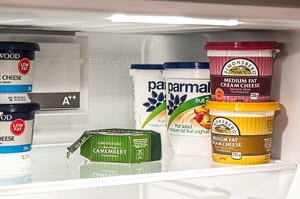
Actually a bacteria never diesa single bacteria reproducing by binary fission. After thawing they come to life and begin to multiply.
When food is thawed bacteria can still be present and may begin to multiply.
Does bacteria die when refrigerated. However some bacteria such as Listeria monocytogenes Lm thrive at cold temperatures and if present will grow in the refrigerator and could cause illness. For additional information visit Foodborne Illness and Disease. Live chatChat with an Expert.
Bacteria do not die when they are refrigerated or frozen. Low temperatures merely slow their metabolism and thus slow their rate of division. Freezing food kills harmful bacteria that can cause food poisoning Bacteria can survive freezing temperatures.
Freezing is not a method for making food safe to eat. When food is thawed bacteria can still be present and may begin to multiply. There is an exception to the general rule that refrigeration minimizes bacterial growth.
Listeria monocytogenes a bacteria that causes serious illness can grow at refrigerator temperatures so make sure you clean up spills in the fridge immediately. Additionally thoroughly cook meat and poultry to 160 F and check it with a food thermometer. Yes freezing Greek Yogurt may kill some bacteria but not all of them.
When you freeze Greek Yogurt the good bacteria or probiotics become dormant. When you defrost it and the yogurt is back to room temperature good bacteria will be active again. Does freezing yoghurt kill probiotics.
Theres a big difference between 40 and 44 degrees A fridge thats set anywhere above 40 degrees Fahrenheit allows bacteria to grow. Although a chillier environment wont kill bacteria it does keep it from multiplying to the point that it can make you sick Feist explains. A refrigerator does not kill most food-borne bacteria.
The purpose of storing food in a refrigerator is simply to extend the shelf life of perishable food. Cold temperatures stop the growth of some bacteria imposing dormancy on them until temperatures warm up. No unfortunately thats not always the case.
According to the US. Food and Drug Administration reheating your lasagna might indeed kill the bacteria that were likely produced when it sat out overnight. But your problem doesnt stop there says the FDA.
Hot temperatures can kill most germs usually at least 140 degrees Fahrenheit. Most bacteria thrive at 40 to 140 degrees Fahrenheit which is why its important to keep food refrigerated or cook it at high temperatures. Freezing temperatures dont kill germs but it makes them dormant until they are thawed.
Hot temperatures can kill most germs usually at least 140 degrees Fahrenheit. Most bacteria thrive at 40 to 140 degrees Fahrenheit which is why its important to keep food refrigerated or cook it at high temperatures. Freezing temperatures dont kill germs but it.
Once its in the refrigerator we can relax a little about our food. Bacteria in cold environments stop their relentless growth limiting the number of food-borne illness-causing bacterial cells and preventing other hoards of ravenous bacteria. Bacteria do not die when they are refrigerated or frozen.
Low temperatures merely slow their metabolism and thus slow their rate of division. Actually a bacteria never diesa single bacteria reproducing by binary fission. It divides into 2 cellsso actually there is no death.
At caseslike lack of food source bacteria diesall bacteria does not die at same timeas because all r not reproduced at same time. Freezing kills some amount of bacteria and germs but usually most of them enter a dormant state and stay alive in the frozen food or liquid. These bacteria are not killed.
After thawing they come to life and begin to multiply. However a lot depends on the species of. Hot temperatures can kill most germs usually at least 140 degrees Fahrenheit.
Most bacteria thrive at 40 to 140 degrees Fahrenheit which is why its important to keep food refrigerated or cook it at high temperatures. Freezing temperatures dont kill germs but it makes them dormant until they are thawed19 dec. Does cooked green beans need to be refrigerated.
Cooking Green Beans Ahead-of-Time. To keep their freshly-cooked taste once cooked to your liking dry them thoroughly in clean towels and then refrigerate them in a covered bowl. Will keep for about 4 days wrapped in plastic bag or wrap refrigerated.
How long do cooked beans last unrefrigerated.